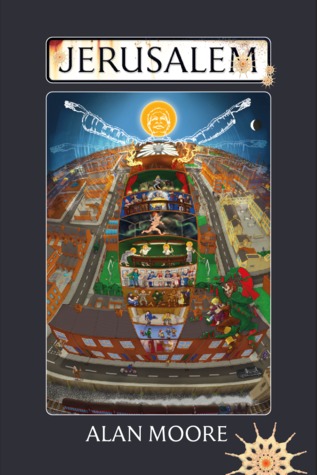More on this book
Community
Kindle Notes & Highlights
As usual, he wondered vaguely what had happened to their willies but was confident that this would all make sense eventually, like jokes or frost-patterns.
Deep in his phantom memory of a tummy he could feel the tickle of the flames, developing to an unbearably delightful and insistent itch that felt, if anything, much, much too good. It sort of made him want to do things just on impulse without any thought for whether they were right or not, and he was glad when they were out of the infernal alleyway and crossing over what was left of College Street.
“Because that’s not how the tale goes. At no point within the narrative that Mercy read me did it say that poor old Mr. Doddridge intervened and told you how the story ended, so that you could skip ahead and spare yourselves the bother. No, you’ll have to work it all out on your own. For all you know, the bother that you’re so keen to avoid might be your yarn’s most vital element.”
What was it like, she wondered, going mad? Were you aware that it was happening? In the first stages, did you still possess a measure of self-consciousness allowing you to notice that the world surrounding you and your responses to it were markedly different from the way they used to be? Did people fight against it, the descent into insanity? It struck her that, for a great many people, ordinary life itself was something of a surface struggle.
I know I am a text. I know that you are reading me. This is the biggest difference that there is between us: you do not know that you are a text. You don’t know that you’re reading yourself. What you believe to be the self-determined life that you are passing through is actually a book already written that you have become absorbed in, and not for the first time. When this current reading is concluded, when the coffin-lid rear cover is eventually shut tight, then you immediately forget that you’ve already struggled through it and you pick it up again, perhaps attracted by the striking and
...more
The world is no more than an aggregate of your ideas about the world, of your ideas about yourselves.
As the instant stretched itself, she realised that she’d accidentally jumped free of all her fears and limitations, fears of injury and death and ruin. Trusting only to the moment she’d propelled herself past doubt and gravity and in that moment had known with abiding certainty that there was nothing she was scared of, nothing that she couldn’t do.
She sees ideas much as a farmer sees his pigs, and doesn’t even want to waste the squeal if she can help it.
she’d formed a vision of the world as glorious and mutable, liable to explode into unlikely new arrangements if you simply paid enough attention; if your eye was in.
Ophailure synching intow the abskewer gruen dipths.
Henry raises up a rough church in his heart what he can carry with him where he goes, poking around in the old barns and that, with humming to himself instead of organ music and the stained-glass light spilled out of his imagination on the floor in all the straw and horse muck.
Being the chosen one has always been a burden, and he finds that he and Andy grow much closer in the cosy doghouse of paternal disapproval.
It occurs to him that what he wants the most is his whole life again, all of the things what are most dear and most familiar to him.
Mind you, in my own ordeal I spent so hard that there were letters of the alphabet came fluttering from my ears.
When I met her I was callous and I couldn’t bring myself to see that she was drowning. I could have done more, that’s all I’m saying. Or I could have done less. One way or the other. It’s too late now.
If as you say He never comes, can you be certain He is truly there? BECKETT: I would imagine that is where the faith comes into it. For my own purposes I like to think His non-arrival is not necessarily an indication of His non-existence.
Studs likes to believe, despite the overwhelming evidence which clearly contradicts his theory, that the forces governing existence have a dramatist’s approach to human narrative. He likes to think such entities might have a fondness for last-minute death row pardons, million to one gambles or hair’s-breadth escapes and, as a consequence of this belief, has largely led a life of serial disappointment. But
Don’t make the wrapping paper more intriguing than the gift inside, an edict which Studs ruefully accepts could equally apply to his own inner loveliness and its regrettably attention-grabbing packaging.
In oddball works like that, Studs soberly reflects, the tale turns out to have been more about the labyrinthine mental processes of the protagonist than the contortions of the case he’s trying desperately to solve.
It had felt more like meeting with a crush from junior school, that meaningless vestigial flutter of the heart, the sweet and pointless sadness for alternate universes that would never happen.
I’ve saved it the way that you save ships in bottles. It’s the only plan that works. Sooner or later all the people and the places that we loved are finished, and the only way to keep them safe is art. That’s what art’s for. It rescues everything from time.”
I sometimes think that loss is all he runs on; that he never loves a thing so much as when the wheels have fallen off.


